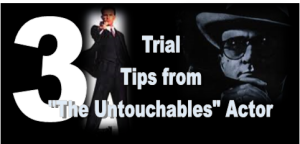Three Trial Tips From “The Untouchables” Actor
 It’s not a good sign when jurors have to stifle their laughter while trial counsel is in the middle of an earnest, impassioned closing argument.
It’s not a good sign when jurors have to stifle their laughter while trial counsel is in the middle of an earnest, impassioned closing argument.
Nor does it bode well when members of the panel nod off during key testimony.
Yet those were some of the impressions of a New York City actor and playwright who served on the jury for a medical malpractice trial.
From the Stage to the Courtroom
For the past 40 years, Sean Grennan has earned his living in the performing arts. He writes scripts and stage plays. He has acted in the films “Rudy” and “The Untouchables” and the television show “Law and Order.”
When he was summoned for jury duty, he says he was less than thrilled. This is so even though he admits to a lifelong interest in the law and even took the LSAT when he was younger. But he came out of the trial with “nothing but respect and admiration for the legal profession and our system of laws.”
He also emerged with some advice for litigators, as reported in this ABA Journal article.
Why should you care what the author of the play “Beer For Breakfast” has to say about trial advocacy? For one thing, he had a front-row seat to a lengthy, complex case. That alone makes his observations worthwhile.
For another, his job as a writer is not all that much different from yours as a lawyer:
“[I]f your practice involves talking to a jury, then your profession is storytelling. Just like mine. Really, that’s what it is. Boil away the cumbersome (but necessary) procedural stuff and you’re telling a story.”
Three Trial Tips
- Less is more. “Try not to bore us. The trial I was on was a medical-malpractice case, so there were many technical medical terms that, of necessity, we had to wade through. No way around it. But if something is superfluous or tangential—even if you find it fascinating: Move along. Keep the narrative flowing. We the audience are trying to absorb a lot of info that you might have had months or years to get used to. Talk slowly and assume we have the attention span of a puppy in a ball pit.”
- Be good on your feet. “The audience doesn’t lie. If, during your performance, jurors start to cough, shift in their seats, look around, mentally play Sudoku, they’re telling you something. Don’t argue—fix it! But what if you’ve got a great plan, a killer script? You don’t have to rewrite on the spot, do you? Yeah, you do. The best of you can add a little improvisation. See glazed eyes? Say something funny or sad; or drop something; do something that gives us a few moments of relief before you plow on. Self-deprecation is fantastic! Make fun of your skirt or tie or car or baseball team or weight. Be human, see us check back in, and then go on.”
- Be a good actor, or don’t act. “OK, this is a tough one and you might need some professional coaching or something to achieve it. A bad actor can be improved. A non-actor cannot. When one of the lawyers got up to show how passionate he was about his case, but then let some fakey-fake-fake emotion choke him up, we didn’t buy it. We wanted to laugh. Emotional substitution: Remember the day your dog died right before you get up to defend a toxic polluter. It can work! But really, if you’re not a good actor, don’t let your pride tell you that you are. Stay in your lane—you can still tell a good story.”
Grennan recalls one dramatic moment at trial. The plaintiff’s lawyer presented a timeline of key events that occurred during a critical hour during a labor and delivery. Counsel broke the hour up into 10-minute increments. As the timeline appeared on screen, a medical expert explained what happened during each segment.
The presentation was clear and to the point. It was powerful. It was moving.
Like a good story, it captured the attention and empathy of the audience – and won the case.
Sources:




